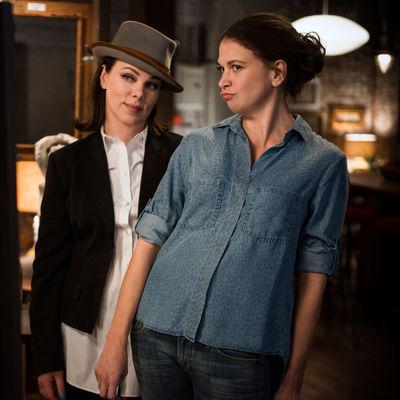
“She sees girls like us come in here with fresh ovaries and faces plumped with natural elasticity, and she just wants to destroy us,” declares a publishing assistant in her 20s about her 40-something boss on the new show Younger. The show, the latest from Sex and the City creator Darren Star, is unnaturally obsessed with the conflicts between Gen-X and Gen-Y women. Its plot twist is that one of the assistants, Liza, is only pretending to be 26 — she’s actually the same age as her tyrannical boss. After years off the career track, her husband left her penniless, so she’s faked her millennial status to get an entry-level job in publishing.
The show draws heavily on the cliché that older women are jealous of younger women and therefore treat them like shit — but on this point, Younger feels incredibly out of date. Women at 40 are not exactly sexually irrelevant has-beens being pushed off the stage by 20-somethings trying to take their places. Chloë Sevigny is 40; Marisa Tomei is 50! But it’s not just well-preserved celebrities who seem to be enjoying what used to be thought of as middle age. In a 2013 Harris Interactive poll, most people said their ideal age is 50.
It makes a certain amount of sense. If adolescence has been extended well into the 20s and the 30s are a mess of child-rearing and career-climbing, the 40s are when many people are finally approaching a high point: Careers are humming along, decisions about kids have been made (for the most part), relationships have been solidified or abandoned. No one would argue that 40-something women have it all figured out, but there are fewer open questions — Where will I be? What will I do? Whom will I do it with? This holds real appeal for a 20-something for whom these questions loom large and unanswered. “As arrogant as millennials can be,” says Kim France, the former Lucky editor who now runs a site called Girls of a Certain Age, “there is something just inherently soul-crushing about your 20s. It’s possible they can’t imagine ever having it that together.”
There are still some real culture clashes between the generations. Margit Detweiler, who’s 47 and the founder of Tue/Night, an online magazine for women in their 40s, has confessed that sometimes “young women with topknots and thick black glasses eye you like a strange, irrelevant species.” And one woman who works in publishing — the industry in which Younger is set — told me her first boss was “absolutely horrible” to her and other younger women in the office, constantly belittling them. But that kind of work relationship is less and less common. “The Devil Wears Prada/Working Girl dynamic between boss and employee is totally outdated,” says Julia Cheiffetz, an executive editor at HarperCollins. As is the notion that 20-somethings have nothing to learn from their older counterparts. “I think that millennials are more achievement-focused so they want to engage with people they think are doing interesting things, regardless of age,” says Christina Vuleta, whose company 40:20 Vision pairs 20-somethings with 40-something women as mentors.
When I asked 20-something women if they were afraid to hit 40, there was some recognition of the disadvantages of lost youth. “I see how much easier it is to move through this world as a woman when you’re young and considered attractive enough to spark people’s — okay, straight men’s — interest,” says the 27-year-old writer Chloe Angyal. But sexual desirability is, she admits, “the crappiest way to gain access and success.” Overall, they were more likely to reply with aspiration than with dread about the decades to come. They said things like, “I hope that by the time I’m 40 I will have some idea what I’m doing,” and “I feel like I’ll have shit locked down by then.” The 28-year-old writer Ashley Ford recently wrote an essay explaining that she wanted to live like she was in her 40s already, with “certainty about who you are and what you’re meant to do in this world.”
“Oh my God! If only,” Detweiler says. “Clearly, we do not have it all figured out.” It strikes me that 20-somethings’ unattainably rosy vision for their 40s might be more to blame for any disconnect between Gen-X and Gen-Y women than outright jealousy — if they see women in their 40s who are still grappling with life’s big questions, they think, Aren’t you supposed to be done with this phase of your life? It’s hard for real 40-something women to live up to the standards that 20-somethings have set for their idealized future selves.
“I will say that I look at most female editors in their 40s and think, I don’t want your life,” admits one younger editor. “I think they’re uncool. Some of this is simply that I don’t like their taste (and I probably wouldn’t have liked it when they were in their 20s and 30s). But it’s also because it seems like they’ve let certain industry standards dictate their lives and their careers in a way that I’m just not willing to do.” Compromise is not cool. And yet, as any 40-something woman will tell you, it is a part of almost every career and every life. The advantage of your 20s is the same thing that is terrifying about them: All options are open. You haven’t had to make too many difficult choices yet. And perhaps, hopefully, the choices will be different for the next generation.
“What I do envy in 20-something women is the time they have ahead of them,” says Tami Winfrey Harris, author of The Sisters Are Alright. “I wouldn’t want to turn back the clock to my 20s as much as I would love to add 20 years to my life expectancy — to give more-mature me time to be great.”




